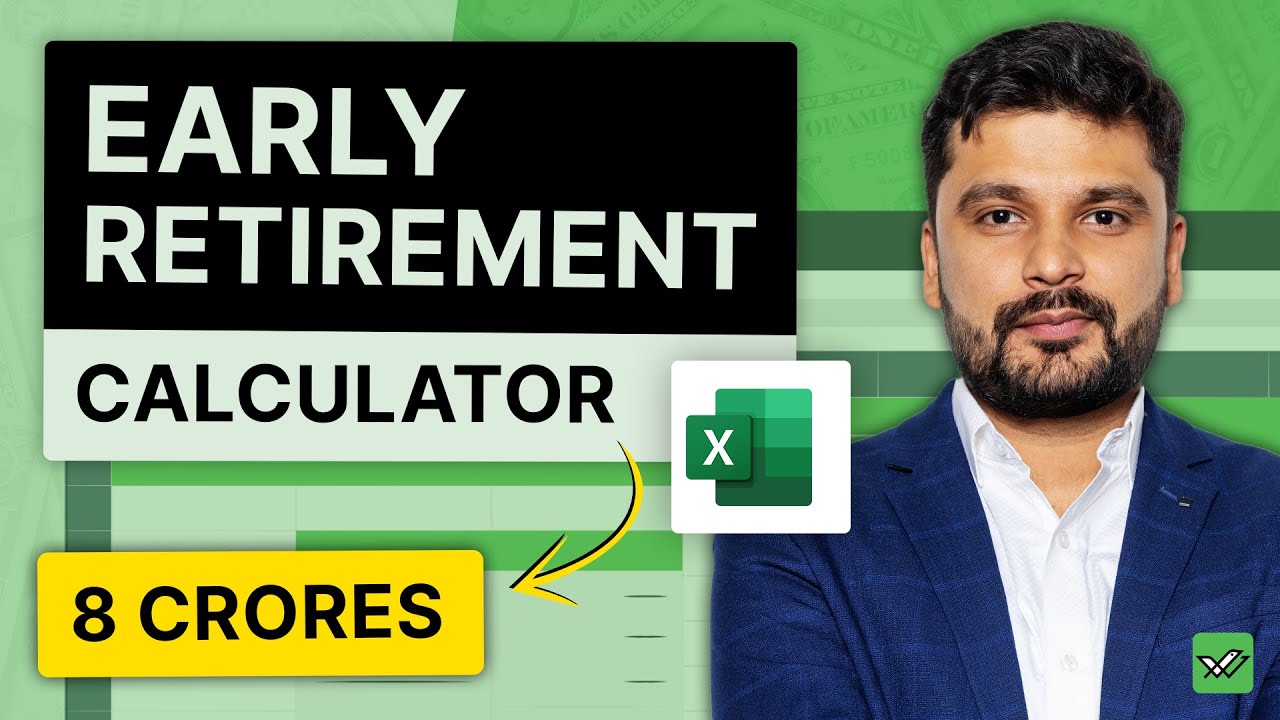
How to Plan for Early Retirement: Exclusive Retirement Calculator
Jason 0 Comments Retire Wealthy Retirement Planning Tips for Retiree's
When someone says the word Retirement, what comes to your mind? Is it the age at which you would probably retire or is it the bank balance that you would have or the abundant time you will have to do whatever you like doing. I think it's a combination of all three. Because all these three require lots and lots of money. Yes, in today’s video we will talk about how you can retire successfully and can generate enough corpus that your lifestyle does not get affected at all. Hi, I'm Samarth, for the past 11 years, I have been working in the finance industry and I'm currently the investments lead at wint wealth. Retirement, it should essentially mean financial freedom. In today’s example we will assume that you started your job or career at 22 or 23 years of age. And as of today, your age is 30 years. For the next 20 years, we are assuming that you'll continue your active line of work, essentially meaning that you will retire by the age of 50. Wait, wait, wait! I know you might be wondering that this video was for early retirement.
See the idea is to let you know that what should be the method for retirement calculation. If you are a little aggressive on that, you might retire by 40 itself or by 45. It all depends on your consistency and your persistence. For the time being , we have calculated this on a very conservative way and hence 50 has been considered as the retirement age. So now we'll be focusing on the example and for this we will be looking at the excel sheet. By the way, this Excel sheet that you can see on the screen can be downloaded using the link in the description and also help us know in the comments if you found this Excel sheet to be useful.
Infact, you can also download sheet right now and use it live while watching the video. You can change the numbers and see if it is suiting you and how it can help you to achieve your retirement. We have assumed that your current age is 30 years. And you started your work life or your career or your job around 22 or 23 years of age. You want to retire at the age of 50 years, your life expectancy is around 80 years. Now because you have already worked for around 7-7.5 years, we are assuming that you have saved roughly two to two and a half lakh per year, so your total savings as on date would be 16 Lakh Rupees. How is this split? Majority portion of investment is done in mutual funds. I too personally, when I started my career, so majority savings (up to 80-90%) I used to do in mutual funds. And I used to split them into growth mutual funds and a small part into dividend mutual funds.
After that since you are doing a job, you will contribute towards EPF. So we have assumed that this is around three lakh rupees. For emergency fund, you have kept some money into FD or bank balance, which is around two lakh rupees, and then remaining money, you have explored another debt option that is public provident fund and under this you have invested two lakh rupees. Basis our assumption and calculation, on this entire corpus of 16 Lakh Rupees up to the age of retirement, that is for the next 20 years, you will generate 10% returns.
So this 16 Lakh Rupees will get converted to 1.15 Crore Rupees. Yes, You heard it right. Believe me, if you do the savings consistently and in a discipline way, your Corpus becomes massive slowly. By the time I had completed five years in my job, I had enough money to pay for my car all in cash. But does that mean that mean, I did so? No. By the way, if you want to know if it makes sense for you to buy a car or use services like Ola and Uber, please watch this video. Now we are assuming that your monthly take home salary is one lakh rupees. And out of this 60,000, that is 60% of your take home salary is spent by you. After that how much would be your savings? 40,000 Rupees. Now if you keep saving this monthly, consistently in a discipline way, then you can easily generate the amount of corpus such that during your retirement life, you can manage your lifestyle very easily and won’t be financially dependent on anyone.
Next assumption which we have taken is that on your salary you will get an increment of around 8%. I know you might be feeling that the 8% figure is too high but you must also consider that although there might be years when you get only 5% or 7%. I really wish you never get so low increments, but there will be years when you will switch your job or get promotion, when your increment might be 20%, 25%. During your pre retirement age, that is up to the age of 50 years we have assumed that years care, return 10% on the amount which you're investing and on the corpus, which you already have save.

Then after retirement this figure drops to 7%. I know you must be thinking this is low, but considering that after retirement your priority will be to save capital and also beat inflation to maintain your lifestyle 7% is a very healthy number. One very important assumption that we have taken is that after retirement there will be a lot of expenses that you won't be incurring. For example, your petrol and traveling expense will reduce substantially. Then it is also true that services like internet where you require a speed of 1 GB currently, will come down to 100 or 200 MBPS then. So that will reduce your expenses. And there are many other such expenses. Okay. So we have assumed that there will be reduction of around 20% to your expenses post retirement.
All these expenses have been adjusted against inflation at the rate of 6%. There are many such expenses which are incurred once or twice in our lifetime. One of them being expenses for sending your child for higher education. If on today’s date, you send your child for higher education so may be you will spend around 30-32 Lakh Rupees, to send the child at a very good institution. This we have assumed that when you will be 52 years old, this expense will occur and at that time, considering the inflation of 6%, this will be around 96 lakh rupees. Now that you have sent your child for higher education, then after he gets settled, probably he or she will get married.
Right? We have assumed that if today you got for their marriage then you will end up spending around 25 Lakh Rupees. According to your assumptions, this event will occur when you will be 60 years old. At that point of time, you will be spending around 80 Lakh Rupees. So this also has been built in, in this model. Last but not the least and definitely one of the most important is: medical expenses. As and when you age increases, simultaneously your medical needs will also probably increase. I really wish, this doesn’t happen but it is quite possible. So on a conservative basis, we have assumed that by the time you turn 65, you might end up needing a medical expense budget of around 50 lakh rupees. Right? Which up till then will be around 1.6 Crores, right. 35 years from now, it would be around 1.60 crores. So assuming all of this if you see all this calculation, then you will find that you would probably end up needing around 8.25 Crore Rupees as your Corpus so that you can retire comfortably.
If you are able to generate this corpus by investing around 40% of your salary basis the following assumptions, month to month, year on year in instruments, which help you generate good returns like mutual funds and corporate bonds for the early starters, and then slowly and slowly moving towards more of conservative investments, where you can easily generate 9.5-9.7%, then you'll be able to achieve this corpus and basis this calculation, that you can see in the third sheet post retirement, you will see that even after you turn 80 years of age around around one crude Rupe, you will still be left with. So if you save in a disciplined way, start investments, then you can easily achieve your retirement. Under this sheet, you can also put your other additional expenses basis your age.
If you will see we have provided Additional 1 to Additional 8 blank spaces, as when you enter there it'll automatically get calculated and you will keep getting the results. The larger your retirement corpus, easier will be your retirement life, the more you will be able to afford to give to your family and enjoy the moments with them. This is why Savings are important. This is why retirement planning is important. And if you're worried to know how you can make your portfolio stronger and better in this video, we have discussed few revenue streams, which will help you generate passive income along with maintaining the safety of your portfolio until you meet next time. Happy Winting!
.
